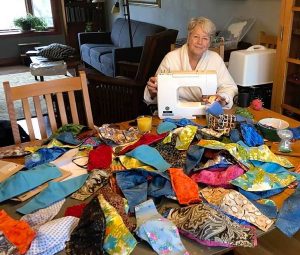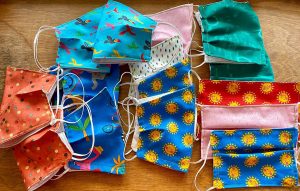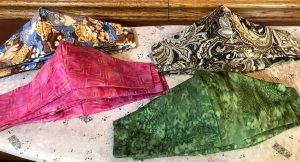With face masks in short supply, homemade creations filling the gap
By Elise Zwicky For Chronicle Media — April 15, 2020
Susan McCabe of Pekin has been sewing cloth face masks at her kitchen table since mid-March and has given away hundreds to the public and to area hospitals. The Centers for Disease Control and Prevention recently issued a recommendation that Americans wear cloth face coverings in public settings. (Photo courtesy of Susan McCabe)
Many central Illinois residents have been dusting off their sewing machines to make homemade face masks after the Centers for Disease Control and Prevention recently recommended that Americans wear cloth face coverings in public settings.
Nancy Seipel of Elmwood and Susan McCabe of Pekin started sewing masks in mid-March around the time Gov. J.B. Pritzker issued a stay-at-home order for Illinois residents due to the pandemic caused by the novel coronavirus. That order has since been extended through at least April 30.
“I just got started basically because I knew there was going to be a need,” said Seipel, who’s been making masks for friends and family and even her mail carrier. “I thought it was only common sense for people who are immunocompromised to wear a mask when they’re out.”
McCabe, who hadn’t sewn anything in 20 years, said, “I just saw the need.”
Both OSF Saint Francis Medical Center and UnityPoint Health hospitals in Peoria began asking the public for donations of homemade cloth masks in late March. Advocate Aurora Health began accepting cloth mask donations in early April at all of its locations, including Advocate BroMenn Medical Center in Normal.
All the hospitals have specific patterns and guidelines to use in making the masks, which can be found on their websites.
OSF Saint Francis has received hundreds of masks since the request went out, according to Libby Allison, media relations coordinator.
“Both clinical and non-clinical (employees) are now welcome to wear their own personal masks, including homemade cloth masks, in situations where masking is not required. When a mask is clinically required by the organization as personal protective equipment (PPE), it should be OSF provided and appropriate for the situation,” Allison said.
As the COVID-19 outbreak continues to expand throughout the world, many hospitals are fearing a shortage of necessary PPE.
“We are working hard to procure, conserve and innovate supplies to ensure we have the right personal protective equipment at the right time and in the right setting,” said Brian Boesen, UnityPoint Health’s regional marketing director.

Nancy Seipel of Elmwood has been sewing cloth face masks for weeks for family and friends, using colorful fabric when possible to add a little cheer during the difficult times caused by the COVID-19 pandemic. (Photo courtesy of Nancy Seipel)
The fabric masks being donated by the public are being used by UnityPoint employees working in non-direct patient care settings. “Team members who provide direct patient care are provided the appropriate surgical mask and any other appropriate (PPE),” Boesen added.
Advocate Aurora Health posted guidelines for wearing cloth face masks on its website April 6. Dr. Robert Citronberg, director of infectious disease at Advocate Lutheran General Hospital, clarified that wearing a cloth face mask is more likely to prevent others from getting infected by you rather than protecting you from getting infected by others.
“Since it is known that people who have the virus but do not yet have symptoms can transmit the virus to others, it is a reasonable strategy to wear a mask in public. But the benefit is limited unless (nearly) everybody wears a mask. Think of it like this: Masks don’t protect each of us, they protect all of us,” Citronberg wrote.
Members of the Central Illinois Chapter of the American Sewing Guild have been replacing rotted elastic on about 50,000 N95 masks that OSF Saint Francis has had in storage since the Ebola outbreak in 2014-15.
The N95s are tight-fitting filtered masks used by healthcare workers on the front lines.
“These masks have been sitting in a warehouse and the elastic straps became brittle and were no good anymore,” said Vicki Ghidina, a retired OSF clinical laboratory scientist, who’s helped spearhead the repair operation.
“Replacing the elastic is a pretty easy job. The biggest problem is finding elastic,” Ghidina said, adding that some of the home sewers have instead been using blue rubber tourniquets often used when drawing blood.

Susan McCabe of Pekin has been sewing various types of cloth face masks, including these designed to fit over the N95 masks used by medical workers. McCabe encourages anyone who knows how to use a sewing machine to make masks to donate to area hospitals. (Photo courtesy of Susan McCabe)
At least 50 guild members from Galesburg to Champaign have been helping with the project. Many are also making cloth masks in their spare time. Anyone who’d like to help can send an email to vicki.ghidina@gmail.com.
Nancy Seipel, who has severe allergies, was used to wearing a mask long before COVID-19 and has been making them with vibrant-colored fabric.
“It’s such a dreary time I thought it would be good to make something cheerful and bright,” she said. “It definitely helps me to know I’m doing something to help protect my family and friends. I think we’re all looking for some way to have a little control right now.”
Seipel emphasized that the cloth masks should be washed after each use, either by hand or in a washing machine.
Susan McCabe has given away hundreds of cloth masks she’s made by hanging them on a clothesline outside her Pekin house for anyone that needs one. She also is donating some to the hospitals.
“I’m making the ones that fit more snugly on your face. They also have a pocket so a filter can go in that,” McCabe said. After she posted on Facebook, people have left fabric, thread, sewing machine needles and even an extra-large surgical suit on her porch that she cut up and used as filters in many masks.
“I would definitely encourage others to make them if they have even minimal sewing experience and if they have a sewing machine,” McCabe said.
OSF Saint Francis is accepting masks in bundles of 25 placed in a zip-close bag at the Franciscan Prairie Building, 5901 W. War Memorial Drive in Peoria. They also will accept respirators, gloves, wipes, thermometers and hand sanitizer. For more information, email supportosf@osfhealthcare.org or visit www.osfhealthcare.org/covid19/give.
UnityPoint Health is accepting donations of handmade cloth masks, vacuum cleaner bags and bias tape between 9 a.m. and 2 p.m. weekdays at the Hult Center for Healthy Living, 5215 N. Knoxville Ave. in Peoria. For more information, visit the website www.unitypoint.org.
Advocate Aurora Health is accepting donations of handmade masks, as well as new N95 masks, hand sanitizer, eye protection and disinfectant wipes. Locally, donations can be taken to Advocate Bromenn Medical Center at 1304 Franklin Ave. in Normal. For more information, visit the website www.advocategiving.org/covid-19 or email covidaahsupplydonations@aurora.org.







